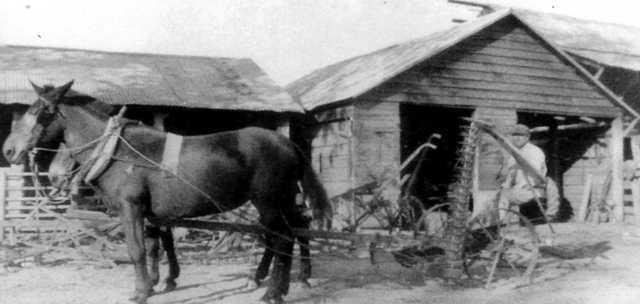My paternal grandmother Annie Mae Reiser Exley’s Aunt Mary Felisher “Aunt Lish” (born in 1846) married Benjamin Metzger who lived in the edge of Clyo. They had 6 children including 2 daughters, Kate Olive who married Thomas Maner and Bertha May who died unmarried. Four sons were born to the couple: Julius Brutus who died unmarried, Cassius Clay “Cash”, Augustus Caesar and Jefferson Cortez. Of these brothers the only surviving male descendant was Cortez’s son Jefferson Cortez Metzger, Jr. who inherited their large farm near the Savannah River. In time Albert and George Allen came to own the property and some of their grandchildren reside in what was once the large fields of the farm.
They were innovative farmers for the time. Cash farmed with two sets of mules, changing them at noon. The mules pulled the plow. On some of their property corn was planted “in the check”. They laid it off and plowed rows east to west and north to south in a checkerboard fashion. The seed were planted by hand and the corn was handpicked. Many mules were used throughout the farm. The brothers fertilized heavily ordering, a boxcar full of fertilizer at the time by rail and made good crops. If anyone bragged on their yield they would top their story.
Caesar made woven oak baskets for farm use, egg gathering and many purposes in lots of sizes. He sold them as well as had them for their use. The split oak strips he cut were soaked in a pond or stream and made pliable to weave. These were strong sturdy baskets and some have lasted decades when stored in a good dry place.
They raised produce like green corn, potatoes, beans, watermelons and peas for market. The Metzgers had hired help on the farm to harvest the vegetables and pick corn and whatever they needed. Cortez hauled a good big truck loaded with produce to what was then the Savannah City Market (now torn down in the area known as City Market) and unloaded it leaving some men with the produce to sell. The next day he came back for the money and brought more.
Cash was in charge of the farming. Caesar was the blacksmith, making many tools. Caesar invented a machine that would cut seed potatoes into pieces to plant by turning a crank. He could make anything he wanted. Cortez was mostly over the produce division of the farm.
The mule barn caught fire and burned down. Caesar said if he was still young and in his prime he would have it rebuilt in two days. Of course it could not have been done in that short time.
Cortez’s wife Maggie had a Buick but he told everyone it took her so long to go to Atlanta and back that he sold it and got a Cadillac that was faster. He said she would leave early in the morning and go to Atlanta and shop for a while and be home by supper. This was the days of dirt roads and everyone knew this was just another of the Metzger Brothers’ tall tales.
Caesar was interviewed by a newspaper reporter and told the reporter that he did not know if he was Caesar or his brother that had died.
They were eccentric. Cash did all the farming barefooted most of the time. They lived a life of hard work and were examples to all in productivity and yield on the farm. The Metzgers did not take to strange people too quickly. Yarns or tall tales were part of their everyday life.
This was written by Susan Exley of Historic Effingham Society. If you have photos or information to share contact her at hesheraldexley@aol.com








